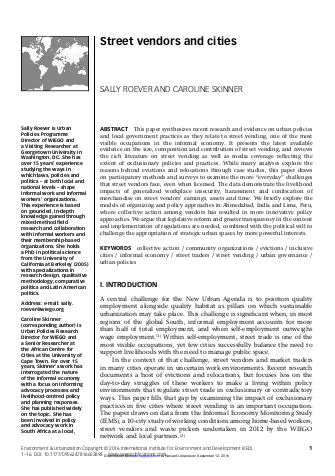Environment and Urbanisation | Special Issue on Urban Livelihoods

This paper synthesizes recent research and evidence on urban policies and local government practices as they relate to street vending, one of the most visible occupations in the informal economy. It presents the latest available evidence on the size, composition and contribution of street vending, and reviews the rich literature on street vending as well as media coverage reflecting the extent of exclusionary policies and practices. While many analyses explore the reasons behind evictions and relocations through case studies, this paper draws on participatory methods and surveys to examine the more “everyday” challenges that street vendors face, even when licensed. The data demonstrate the livelihood impacts of generalized workplace insecurity, harassment and confiscation of merchandise on street vendors’ earnings, assets and time. We briefly explore the models of organizing and policy approaches in Ahmedabad, India and Lima, Peru, where collective action among vendors has resulted in more innovative policy approaches. We argue that legislative reform and greater transparency in the content and implementation of regulations are needed, combined with the political will to challenge the appropriation of strategic urban spaces by more powerful interests.
Links
Resource collections
- UN Habitat - Urban Response Collection
- Urban Response - Urban Crisis Preparedness and Risk Reduction
- Urban Response Collection - Community Engagement and Social Cohesion
- Urban Response Collection - Economic Recovery
- Urban Response Collection - Environment and Climate Change
- Urban Response Collection - Housing, Land and Property
- Urban Response Collection - Urban Crisis Response, Recovery and Reconstruction
- Urban Response Collection - Urban Resilience